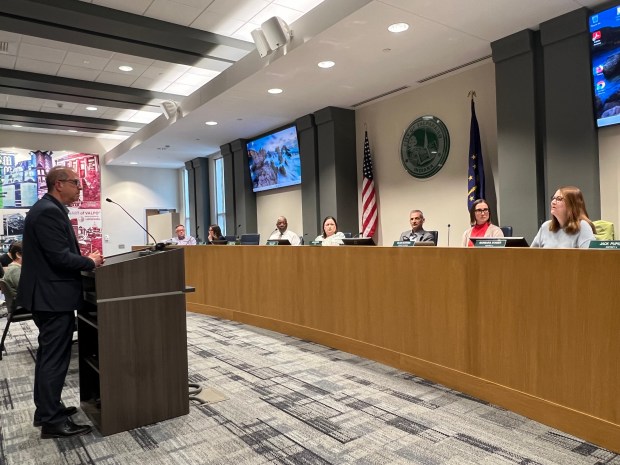A witness who said she was in the car when Jessica Flores was fatally shot testified she didn’t go to the police partially because she thought Drew Carter could kill her.
“He told me Jessica wasn’t the first person he killed that day,” she said.
The Post-Tribune is not identifying her over concerns for her safety.
Carter, 46, of Gary, is on trial this week in the shooting death of Flores, 36. Authorities estimate she was shot dead on Feb. 24 or 25, 2019. Her skull and vertebrae were found in Brunswick Park in Gary in April 2020.
He is charged with murder, kidnapping while armed with a deadly weapon, criminal confinement while armed with a deadly weapon, and criminal confinement with bodily injury.
The woman’s admission on the stand came Wednesday afternoon. Defense lawyer Mark Gruenhagen had filed a motion in limine before trial to keep any mention of prior crimes from jurors.
Deputy Prosecutor Infinity Westberg successfully argued to Judge Natalie Bokota that Gruenhagen figuratively cracked open a door to discuss it when the woman said Carter told her he didn’t like leaving “loose ends.”
After she was later narrowly allowed to elaborate, the woman told Westberg that Carter said he had been at a drug house to kill a woman she knew by the street name “little Debbie.” The witness’ arrival with Flores had disrupted that when they got into a brief spat and Flores hit the witness in the face. Carter was angry the other woman was able to slip out the door.
The witness didn’t go to the police for 12 days after Flores’ death. She later said she was scared if she talked to the cops, it would get back to Carter. What were you trying to do, when running from the cops, Westberg asked.
“Stay alive,” the woman responded.
She testified over several hours on Tuesday and Wednesday.
On cross-examination Wednesday morning, the woman told Gruenhagen she and Flores drove back and forth to various places drinking and getting more crack cocaine to stay high.
Gruenhagen questioned parts of her history — including her admitted drug use and a false informing bust. You had no problem lying to the police, he asked. Over “little things,” she responded.
“I wouldn’t lie about a murder,” the woman said.
The woman admitted some details — the order of various stops or lengths of time they spent at each place — were not clear. Her memory was “clouded,” partly due to heavy drug use.
When you spoke to police were you expecting to get anything in return?
“No,” she said.
At one point at the drug house, Flores pulled the witness into the bathroom, telling her she once dated Carter and still loved him.
After she, Flores and Carter left the house, the pair were bickering “constantly,” she said. The woman tried to get out of the car. It was locked.
“Can I (have sex with) her,” Carter asked Flores.
The witness was looking at her phone. When Flores answered no, the witness saw a gloved hand holding a gun, a flash, then “boom.” Flores slumped to the side and the witness said she thought the woman had been shot in the chest. A bullet hole was later found in Flores’ skull.
“I still don’t know where, I think her chest,” the witness said, when asked where Flores was shot. “I thought (if it was) her head, I would have been impacted.”
You would have had blood on you, Gruenhagen asked.
“Yes,” she said, later telling Westberg she was “absolutely” surprised and “grateful” for it.
The witness got out and tried to run before she said Carter caught her and took her to his aunt’s home. There, the witness said he rolled the windows down and left Flores’ body in the backseat. It was on a dead-end street, near woods.
“Sounds crazy, doesn’t it,” she said.
There, he took her into a bedroom, gave her crack cocaine and the gun that she put on a windowsill. She smoked a cigarette with the aunt and went back to get shoes and stuff, making sure Carter was fully asleep before she escaped.
She admitted lying to a firefighter at a nearby station. At a gas station, she didn’t ask for help.
“I wish I would have,” she said, her voice breaking with emotion.
You know how to “play a role” and lie to get what you want, Gruenhagen asked.
“To do drugs, not cry on command,” she said.
A NIPSCO worker gave her a ride to a friend’s. The friend gave her ice for her leg and crack cocaine. He didn’t believe her, thinking the story was “crazy,” she said. The woman later made it to a relative’s apartment.
The woman said she never called an anonymous tip line. Carter said he didn’t leave “loose ends,” the woman said.
You later told cops you didn’t want to get into anything you couldn’t get out of, Gruenhagen said.
They were my “exact words,” she said.
In her argument, Westberg said authorities learned during the Flores investigation that Carter “had said he killed other people” and “little Debbie” was a “loose end.”
A Gary Police spokesman did not immediately respond to questions about whether Carter is a suspect in other murder investigations.
Deputy Prosecutor Eric Randall is also assigned. Co-counsel David O’Donnell is assisting Gruenhagen.
mcolias@post-trib.com



